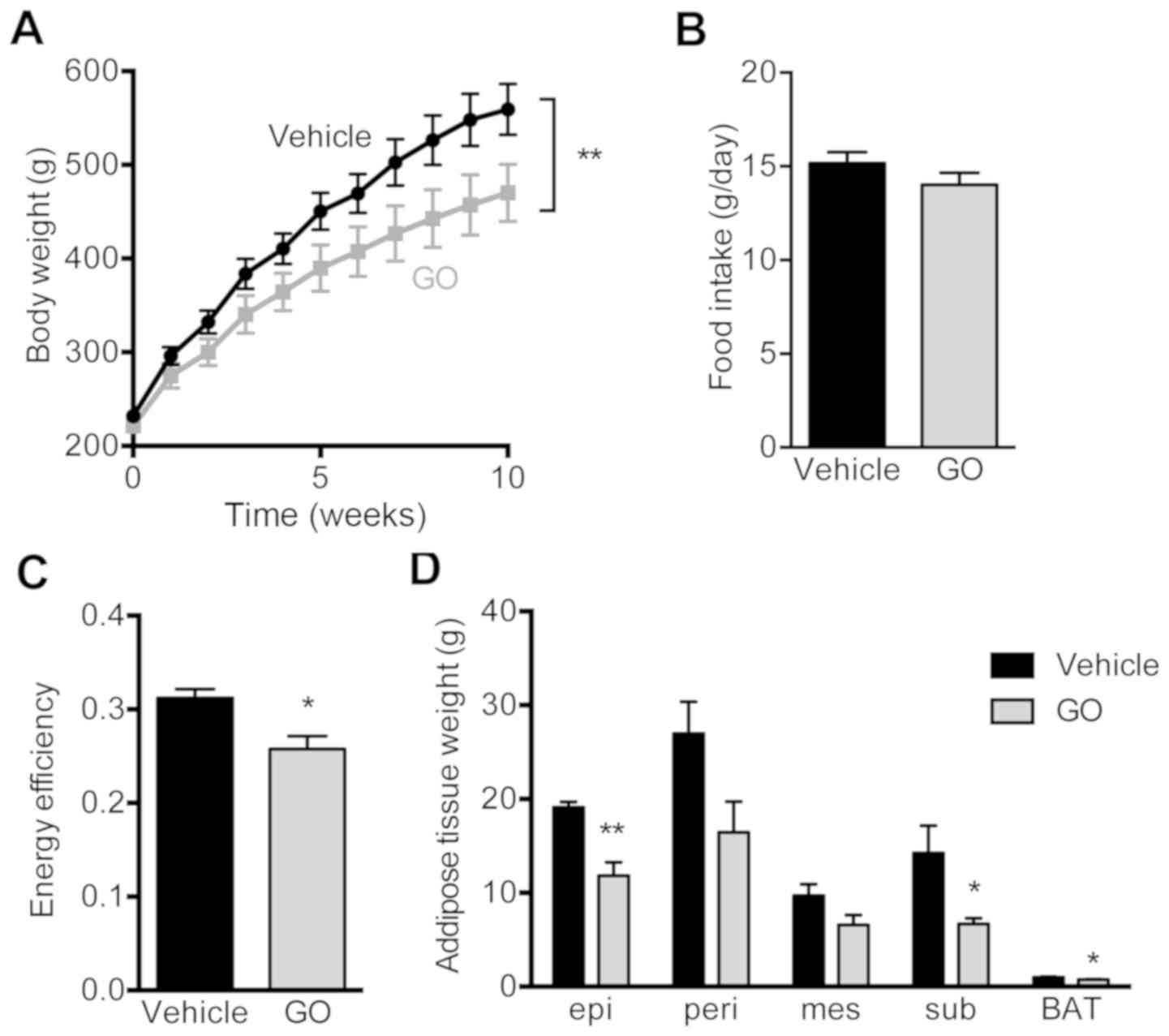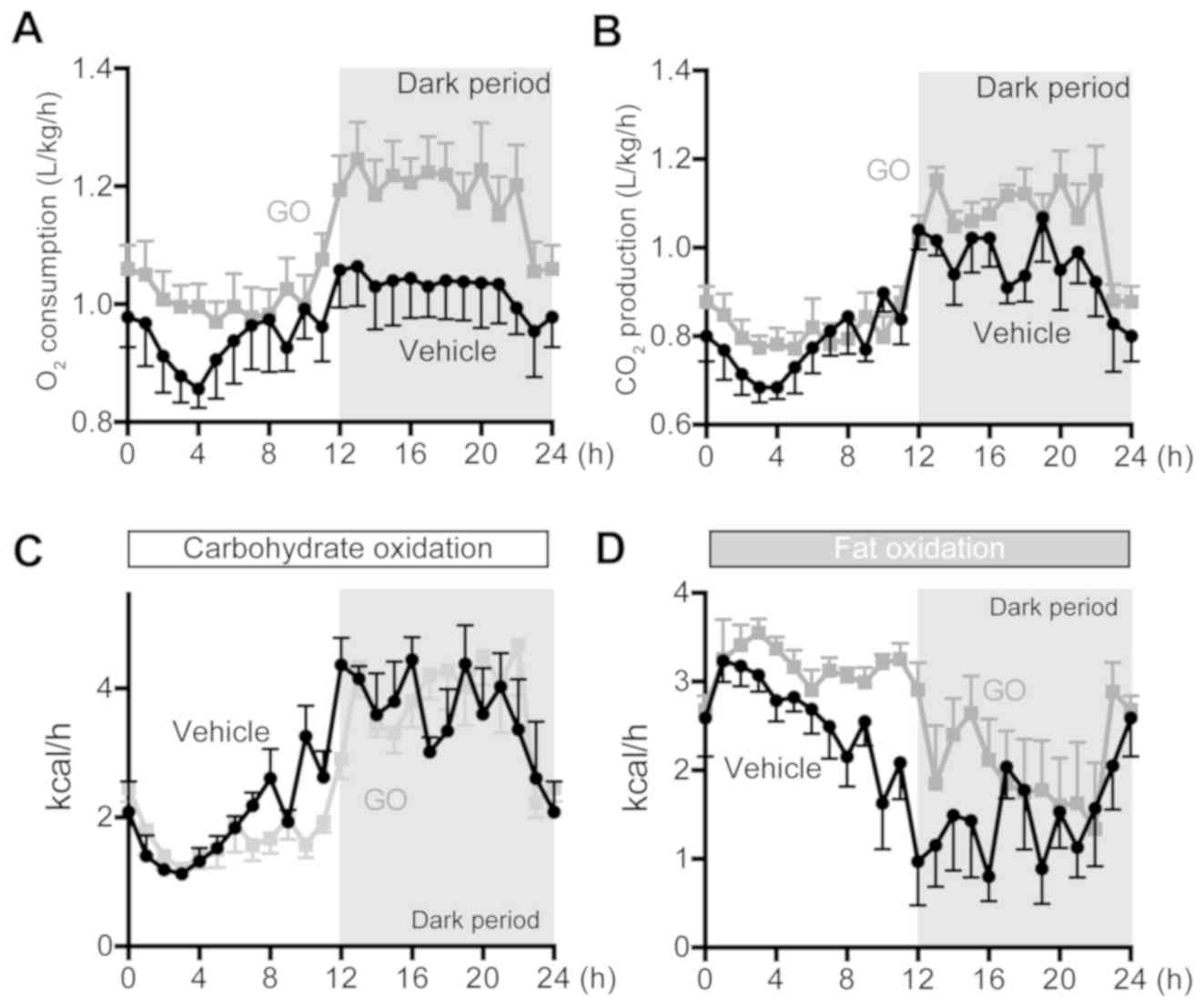|
1
|
Ng M, Fleming T, Robinson M, Thomson B,
Graetz N, Margono C, Mullany EC, Biryukov S, Abbafati C, Abera SF,
et al: Global, regional, and national prevalence of overweight and
obesity in children and adults during 1980–2013: A systematic
analysis for the Global Burden of Disease Study 2013. Lancet.
384:766–781. 2014. View Article : Google Scholar : PubMed/NCBI
|
|
2
|
Rossi F, Punzo F, Umano GR, Argenziano M
and Miraglia Del Giudice E: Role of cannabinoids in obesity. Int J
Mol Sci. 19:E26902018. View Article : Google Scholar : PubMed/NCBI
|
|
3
|
Golbidi S and Laher I: Exercise induced
adipokine changes and the metabolic syndrome. J Diabetes Res.
2014:7268612014. View Article : Google Scholar : PubMed/NCBI
|
|
4
|
Seki T and Hosono T: Prevention of
cardiovascular diseases by garlic-derived sulfur compounds. J Nutr
Sci Vitaminol (Tokyo). 61 (Suppl):S83–S85. 2015. View Article : Google Scholar : PubMed/NCBI
|
|
5
|
García MDC, Pazos P, Lima L and Diéguez C:
Regulation of energy expenditure and brown/beige thermogenic
activity by interleukins: New roles for old actors. Int J Mol Sci.
19:E25692018. View Article : Google Scholar : PubMed/NCBI
|
|
6
|
Bartelt A and Heeren J: Adipose tissue
browning and metabolic health. Nat Rev Endocrinol. 10:24–36. 2014.
View Article : Google Scholar : PubMed/NCBI
|
|
7
|
Ariga T and Seki T: Antithrombotic and
anticancer effects of garlic-derived sulfur compounds: A review.
Biofactors. 26:93–103. 2006. View Article : Google Scholar : PubMed/NCBI
|
|
8
|
Petropoulos S, Fernandes Â, Barros L,
Ciric A, Sokovic M and Ferreira ICFR: Antimicrobial and antioxidant
properties of various Greek garlic genotypes. Food Chem. 245:7–12.
2018. View Article : Google Scholar : PubMed/NCBI
|
|
9
|
Fujisawa H, Suma K, Origuchi K, Kumagai H,
Seki T and Ariga T: Biological and chemical stability of
garlic-derived allicin. J Agric Food Chem. 56:4229–4235. 2008.
View Article : Google Scholar : PubMed/NCBI
|
|
10
|
Fujisawa H, Suma K, Origuchi K, Seki T and
Ariga T: Thermostability of allicin determined by chemical and
biological assays. Biosci Biotechnol Biochem. 72:2877–2883. 2008.
View Article : Google Scholar : PubMed/NCBI
|
|
11
|
Fujisawa H, Watanabe K, Suma K, Origuchi
K, Matsufuji H, Seki T and Ariga T: Antibacterial potential of
garlic-derived allicin and its cancellation by sulfhydryl
compounds. Biosci Biotechnol Biochem. 73:1948–1955. 2009.
View Article : Google Scholar : PubMed/NCBI
|
|
12
|
Ariga T, Tsuj K, Seki T, Moritomo T and
Yamamoto JI: Antithrombotic and antineoplastic effects of
phyto-organosulfur compounds. Biofactors. 13:251–255. 2000.
View Article : Google Scholar : PubMed/NCBI
|
|
13
|
Seki T, Tsuji K, Hayato Y, Moritomo T and
Ariga T: Garlic and onion oils inhibit proliferation and induce
differentiation of HL-60 cells. Cancer Lett. 160:29–35. 2000.
View Article : Google Scholar : PubMed/NCBI
|
|
14
|
Hosono T, Fukao T, Ogihara J, Ito Y, Shiba
H, Seki T and Ariga T: Diallyl trisulfide suppresses the
proliferation and induces apoptosis of human colon cancer cells
through oxidative modification of beta-tubulin. J Biol Chem.
280:41487–41493. 2005. View Article : Google Scholar : PubMed/NCBI
|
|
15
|
Hosono T, Hosono-Fukao T, Inada K, Tanaka
R, Yamada H, Iitsuka Y, Seki T, Hasegawa I and Ariga T: Alkenyl
group is responsible for the disruption of microtubule network
formation in human colon cancer cell line HT-29 cells.
Carcinogenesis. 29:1400–1406. 2008. View Article : Google Scholar : PubMed/NCBI
|
|
16
|
Iitsuka Y, Tanaka Y, Hosono-Fukao T,
Hosono T, Seki T and Ariga T: Relationship between lipophilicity
and inhibitory activity against cancer cell growth of nine kinds of
alk(en)yl trisulfides with different side chains. Oncol Res.
18:575–582. 2010. View Article : Google Scholar : PubMed/NCBI
|
|
17
|
Hosono-Fukao T, Hosono T, Seki T and Ariga
T: Diallyl trisulfide protects rats from carbon
tetrachloride-induced liver injury. J Nutr. 139:2252–2256. 2009.
View Article : Google Scholar : PubMed/NCBI
|
|
18
|
Ried K, Frank OR, Stocks NP, Fakler P and
Sullivan T: Effect of garlic on blood pressure: A systematic review
and meta-analysis. BMC Cardiovasc Disord. 8:132008. View Article : Google Scholar : PubMed/NCBI
|
|
19
|
Ried K, Toben C and Fakler P: Effect of
garlic on serum lipids: An updated meta-analysis. Nutr Rev.
71:282–299. 2013. View Article : Google Scholar : PubMed/NCBI
|
|
20
|
Fukao T, Hosono T, Misawa S, Seki T and
Ariga T: The effects of allyl sulfides on the induction of phase II
detoxification enzymes and liver injury by carbon tetrachloride.
Food Chem Toxicol. 42:743–749. 2004. View Article : Google Scholar : PubMed/NCBI
|
|
21
|
Reeves PG: Components of the AIN-93 diets
as improvements in the AIN-76A diet. J Nutr. 127 (Suppl):838S–841S.
1997. View Article : Google Scholar : PubMed/NCBI
|
|
22
|
Lusk G: Analysis of the oxidation of
mixtures of carbohydrate and fat: A Correction. J Biol Chem.
59:21924.
|
|
23
|
Bruss MD, Khambatta CF, Ruby MA, Aggarwal
I and Hellerstein MK: Calorie restriction increases fatty acid
synthesis and whole body fat oxidation rates. Am J Physiol
Endocrinol Metab. 298:E108–E116. 2010. View Article : Google Scholar : PubMed/NCBI
|
|
24
|
Shen Y, Fukushima M, Ito Y, Muraki E,
Hosono T, Seki T and Ariga T: Verification of the antidiabetic
effects of cinnamon (Cinnamomum zeylanicum) using
insulin-uncontrolled type 1 diabetic rats and cultured adipocytes.
Biosci Biotechnol Biochem. 74:2418–2425. 2010. View Article : Google Scholar : PubMed/NCBI
|
|
25
|
Lee MS, Kim IH, Kim CT and Kim Y:
Reduction of body weight by dietary garlic is associated with an
increase in uncoupling protein mRNA expression and activation of
AMP-activated protein kinase in diet-induced obese mice. J Nutr.
141:1947–1953. 2011. View Article : Google Scholar : PubMed/NCBI
|
|
26
|
Joo H, Kim CT, Kim IH and Kim Y:
Anti-obesity effects of hot water extract and high hydrostatic
pressure extract of garlic in rats fed a high-fat diet. Food Chem
Toxicol. 55:100–105. 2013. View Article : Google Scholar : PubMed/NCBI
|
|
27
|
Kim I, Kim HR, Kim JH and Om AS:
Beneficial effects of Allium sativum L. stem extract on
lipid metabolism and antioxidant status in obese mice fed a
high-fat diet. J Sci Food Agric. 93:2749–2757. 2013. View Article : Google Scholar : PubMed/NCBI
|
|
28
|
Lii CK, Huang CY, Chen HW, Chow MY, Lin
YR, Huang CS and Tsai CW: Diallyl trisulfide suppresses the
adipogenesis of 3T3-L1 preadipocytes through ERK activation. Food
Chem Toxicol. 50:478–484. 2012. View Article : Google Scholar : PubMed/NCBI
|
|
29
|
Keophiphath M, Priem F, Jacquemond-Collet
I, Clément K and Lacasa D: 1,2-vinyldithiin from garlic inhibits
differentiation and inflammation of human preadipocytes. J Nutr.
139:2055–2060. 2009. View Article : Google Scholar : PubMed/NCBI
|
|
30
|
Yonezawa T, Kurata R, Hosomichi K, Kono A,
Kimura M and Inoko H: Nutritional and hormonal regulation of
uncoupling protein 2. IUBMB Life. 61:1123–1131. 2009. View Article : Google Scholar : PubMed/NCBI
|
|
31
|
Koizumi K, Iwasaki Y, Narukawa M, Iitsuka
Y, Fukao T, Seki T, Ariga T and Watanabe T: Diallyl sulfides in
garlic activate both TRPA1 and TRPV1. Biochem Biophys Res Commun.
382:545–548. 2009. View Article : Google Scholar : PubMed/NCBI
|
|
32
|
Szentirmai É and Kapás L: The role of the
brown adipose tissue in β3-adrenergic receptor activation-induced
sleep, metabolic and feeding responses. Sci Rep. 7:9582017.
View Article : Google Scholar : PubMed/NCBI
|
|
33
|
Hankir MK, Kranz M, Keipert S, Weiner J,
Andreasen SG, Kern M, Patt M, Klöting N, Heiker JT, Brust P, et al:
Dissociation between brown adipose tissue 18F-FDG uptake and
thermogenesis in uncoupling protein 1-deficient mice. J Nucl Med.
58:1100–1103. 2017. View Article : Google Scholar : PubMed/NCBI
|

















